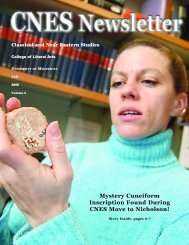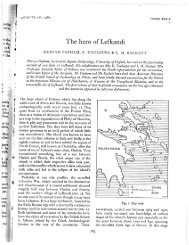September 2007 (PDF) - Classical & Near Eastern Studies ...
September 2007 (PDF) - Classical & Near Eastern Studies ...
September 2007 (PDF) - Classical & Near Eastern Studies ...
You also want an ePaper? Increase the reach of your titles
YUMPU automatically turns print PDFs into web optimized ePapers that Google loves.
FEATURED INTERVIEW:<br />
Christopher Nappa<br />
Director of Undergraduate <strong>Studies</strong> (DUS)<br />
Professor Nappa has been teaching in the department of<br />
<strong>Classical</strong> and <strong>Near</strong> <strong>Eastern</strong> <strong>Studies</strong> since the autumn of 1999.<br />
After completing his B.A. at the University of Texas at Austin<br />
in 1990, he went on to complete an M.A. and a Ph.D. at the<br />
University of Virginia. His dissertation, on persona and character<br />
in Catullus, was supervised by Jenny Strauss Clay and<br />
successfully defended in 1996. Prior to coming to the Twin<br />
Cities, Professor Nappa taught at the University of Tennessee<br />
and Smith College. He has published books on Catullus and<br />
Vergil, as well as numerous articles on a variety of classical<br />
authors. In addition to his scholarly work, he has been serving<br />
as the Director of Undergraduate <strong>Studies</strong> in the department for<br />
the past 4 years, and is currently a member of the editorial<br />
board of the <strong>Classical</strong> Journal. A very popular instructor with<br />
both undergraduate and graduate students, he is known both<br />
for his dry and mordant sense of humor, as well as his keen willingness<br />
to discuss all matters academic with his students.<br />
Professor Nappa is currently at work on a book on Juvenal.<br />
What was your first exposure to classical literature and<br />
the ancient world?<br />
I’m not sure really, but I remember reading books on mythology<br />
very early. I was also given copies of the Iliad and Odyssey in<br />
English as a fairly young child. I’ve always read a lot, so I remember<br />
things like a biography of Julius Caesar for younger readers.<br />
When I was in fifth grade, I transferred to a Catholic school with<br />
a small library. There would be contests for reading a certain number<br />
of books, and I would plow through a lot of these short books<br />
about lives of the saints, and gradually it became clear that I liked<br />
the ones from the Roman Empire best. Ironically, I ended up more<br />
interested in Rome than sanctity. In ninth grade, I started Latin<br />
and that more or less solidified things.<br />
You wrote your MA thesis on a Greek author, but your<br />
dissertation and subsequent scholarly work has been on<br />
Roman literature. How common a career trajectory for<br />
Latinists is this?<br />
I don’t know how common it is, but I don’t think it’s all that rare<br />
for people to change course over time. Latinists do generally have<br />
to deal with a lot of Greek material, so it hasn’t been a bad background.<br />
Also, I think research trajectories often grow organically.<br />
One project leads to another, so if you write a dissertation on a<br />
Latin author, you end up working more on Rome than on Greece.<br />
There are plenty of Greek topics I would happily work on, but<br />
there’s only so much time, and it would mean putting other projects<br />
aside.<br />
What is the focus of your current research?<br />
My big project right now is a book on Juvenal. What I’m trying to<br />
do is provide a counterbalance to a lot of work on his Satires that<br />
focus on rhetoric. People have always looked at his poems from<br />
the point of view of social criticism and social commentary, but<br />
both of those things, criticism and commentary, imply a kind of<br />
rational argument. I think there’s a lot less of that in Juvenal than<br />
some do. Instead, I’m looking at the kind of underlying anxieties<br />
and associations that prompt the speakers to say the things they<br />
do. I’m especially interested in the powerful images that Juvenal<br />
creates. In some ways they’re overdetailed, but those extra details<br />
are important. They point to associations, sometimes unexpected<br />
ones, between different kinds of social problems. For example,<br />
everyone has always known that Juvenal doesn’t like it when people<br />
behave in ways that seem inappropriate to their stations—like<br />
when Nero raced in a chariot or performed on stage—but if you<br />
start to look at the particular images that show up when he talks<br />
about this kind of thing, seemingly unrelated problems get<br />
brought in as well. When aristocrats behave badly, religion ends<br />
up being involved, and so does the strength of Rome’s armies.<br />
What I’m trying to do is map out some of this larger network of<br />
associations.<br />
Are there issues today that knowledge of the classics<br />
would help us solve?<br />
In general I think the world could use more historical awareness<br />
of any kind—particularly in this country. I do think Horace’s<br />
Satires make a pretty good guide to behavior. People should have<br />
to read them before they can finish high school—just like they<br />
should have to read Madame Bovary before they can get credit<br />
cards. On the other hand, I do get a little tired of comparisons<br />
between the United States and the Roman Empire.<br />
—photo by Kelly Macwilliams<br />
15







